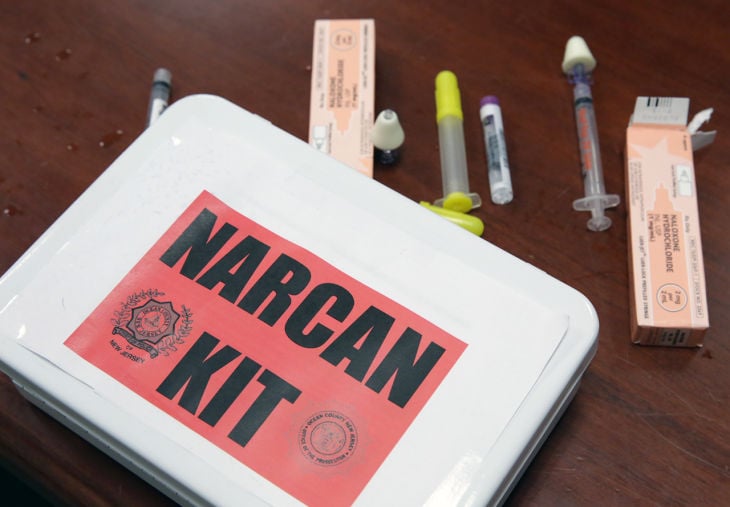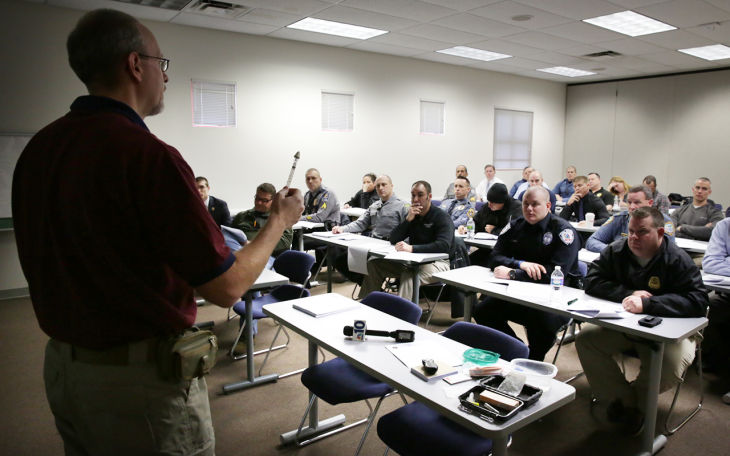To help combat the growing number of fatal heroin overdoses within Ocean County, members of the area’s local police departments attended a hands-on Narcan training exercise, held at the Ocean County Fire and EMS Training Center in Waretown. The county’s police departments are among a small number of the country’s law enforcement agencies that will be able to administer the nasal-spray heroin neutralizer.
“Up to this point, and until we actually implement it, we have to wait for paramedics, and it’s frustrating, as you can imagine. Now there’s an easier delivery system,” said Barnegat Township Police Sgt. Jason Carroll, who attended the two-hour training session on Wednesday, Feb. 26.
 |
| Photo via Press of AC A Narcan kit will soon be in every active patrol vehicle in Ocean County. |
After the call has been made, police officers are usually the first on the scene of a drug overdose.
“It takes us a minute or two to get there, and then the person’s not breathing, but they still have a heartbeat. There’s a critical window there – two, four, maybe six minutes, tops – before their heart’s going to actually stop beating. So it just makes sense for us to have this,” said Carroll.
Kenneth Lavelle, medical director of Emergency Training and Consulting and an emergency room physician at Thomas Jefferson University Hospital, both in Pennsylvania, led the officers through the training process, which included performing a patient evaluation and determining unresponsiveness as well as the absence of breathing and/or a pulse. Narcan will not help revive a person who is deceased and is not recommended for use on anyone younger than 12.
The antidote is administered through the nasal passages, with one milligram shot into each nostril.
“It looks like a syringe, and it’s got a little foam bumper on it,” Carroll explained. When the medication is administered, “hopefully the person will snap right out of it if they’re overdosing from heroin or some kind of opiate like a prescription drug,” he added.
Although there are no potentially dangerous or long-term side effects from the use of Narcan, it does not reverse bodily harm, such as brain or heart damage, from a drug overdose.
 |
| Photo via Press of AC Kenneth Lavelle shows a Narcan applicator during a training session for members of the county's law enforcement agencies. |
Thankfully there have not been any fatal overdoses this year in Barnegat Township, said Police Chief Arthur Drexler. The officers in his department are eager to have the antidote and are willing to help keep overdose deaths from occurring, he added.
“We’re in the business to save lives, whether it’s a serious car accident or a heart attack or a drug overdose,” said Drexler. “It’s part of our duty to save lives, and if it just means carrying a dose of this (Narcan) to expedite the process before paramedics get there, then that’s what we’re doing. We can’t just say, ‘Well, they’re drug addicts; it’s illegal to do,’ and turn a cold shoulder to it. We don’t differentiate between things like that. When we handle a serious car accident, we don’t look to see if the guy has a record. We just help people,” he explained.
Once the Narcan kits are received, Carroll expects to perform a 30-minute training for the rest of his department, which includes 46 officers. A small number of them are EMT-certified, which under law means they are unable to administer the drug. They will not be permitted to administer Narcan until waivers are issued, which, according to the prosecutor’s office, are expected soon.
The police departments do not know how many kits they will receive but were told they will have enough to supply every car on the road. Little Egg Harbor Township Police Chief Richard Buzby has asked for 11.
“I hope we don’t ever use that many, but I’m afraid that we’re going to use several,” he said. “I think it’s important to get this tool in the hands of our people and to try to begin saving lives because we’re in the middle of a very serious situation.”
Little Egg Harbor has had one fatal heroin overdose this year.
Little Egg Harbor Patrolmen Joel Mahr and Ed McNally attended the Narcan training on Friday, Feb. 28.
Some of the department’s officers have expressed concern about administering the medication since it is unusual for them to do, said Buzby.
“However, we’re dealing with a situation that is far from normal,” he added.
Each municipality is expected to write its own Narcan policy, based on the county sample. The prosecutor’s office is expected to pay for the police departments’ first round of the inhalant, which costs about $25 per dose, with drug forfeiture money. If needed, Buzby hopes to increase his department’s budget to pay for extra supplies. He anticipates federal funding will help pick up the tab if the program proves successful.
All those who live with a drug addict are encouraged to ask their doctor to write them a prescription for the opiate neutralizer.
“If it saves one person, to me that’s a success,” said Drexler. “If it eases the pain on the family a little bit, it’s really nice to be able to give the person a second chance, so to speak. Is it going to solve their addiction? No, not at all. But maybe somebody can reach out and help them survive, and maybe the family doesn’t have to go through that.”
“I think anything we can get into the hands of families that are going through this with a loved one is something that we should do as a society,” added Buzby.
He has praised Ocean County Prosecutor Joseph D. Coronato’s persistence to help diminish the county’s heroin crisis, such as increasing the public’s awareness of the problem and pushing for penalties against pushers and distributors to be based on the number of doses of an illegal substance, rather than on its total weight.
“Frankly, I think he’s the most proactive prosecutor in the state, and I’m thankful that he’s there because we’re in the middle of a mess, and we need somebody to help the region,” said Buzby. “It’s not Little Egg Harbor; it’s not Ocean County. It’s the entire region, and it’s nationwide.”
— Kelley Anne Essinger
This article was published in The SandPaper.
No comments:
Post a Comment